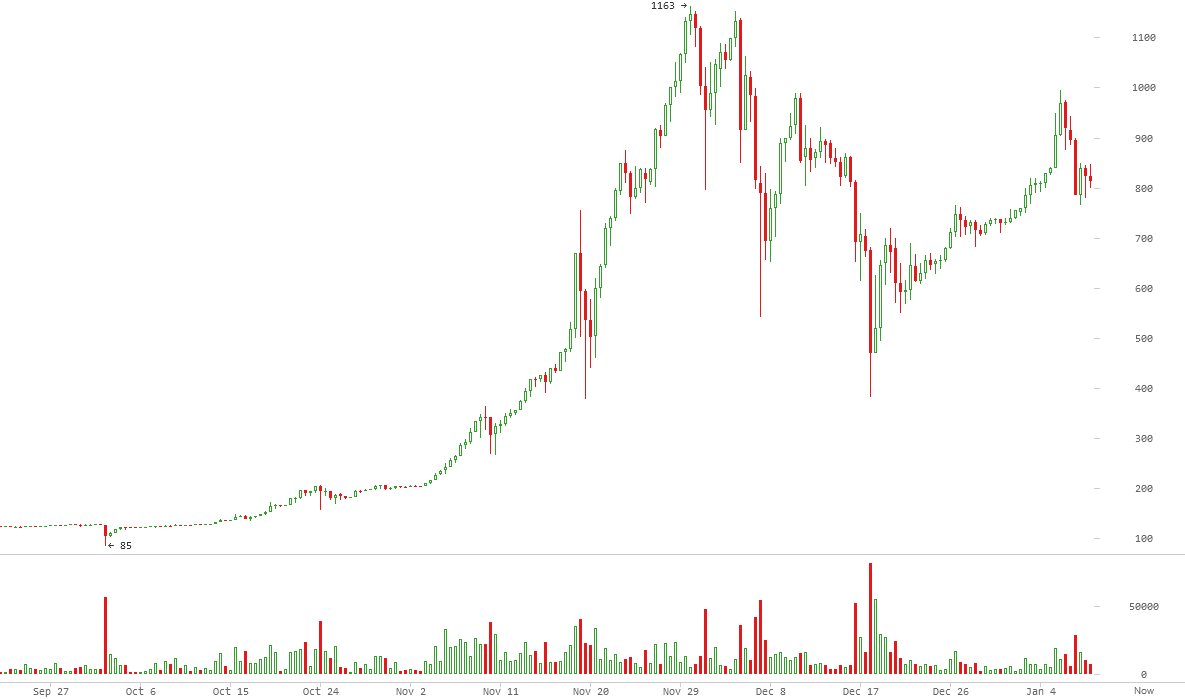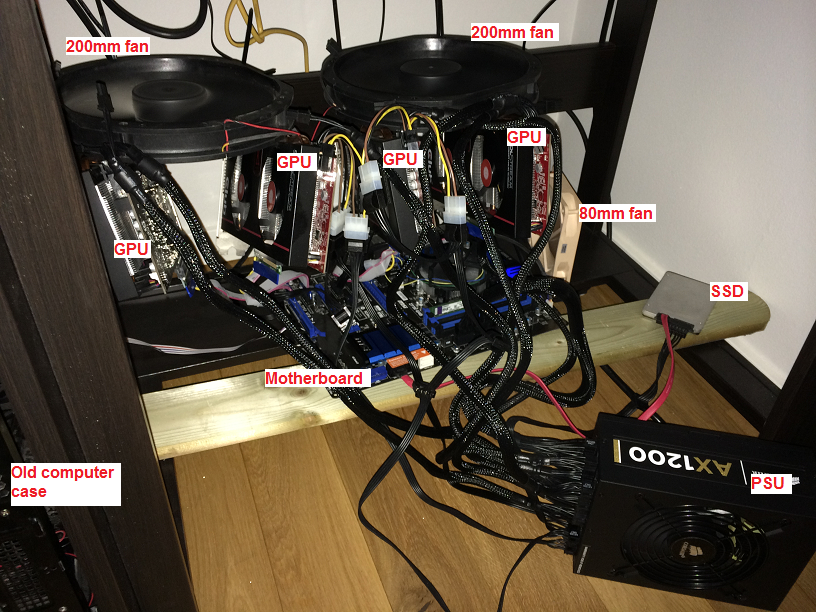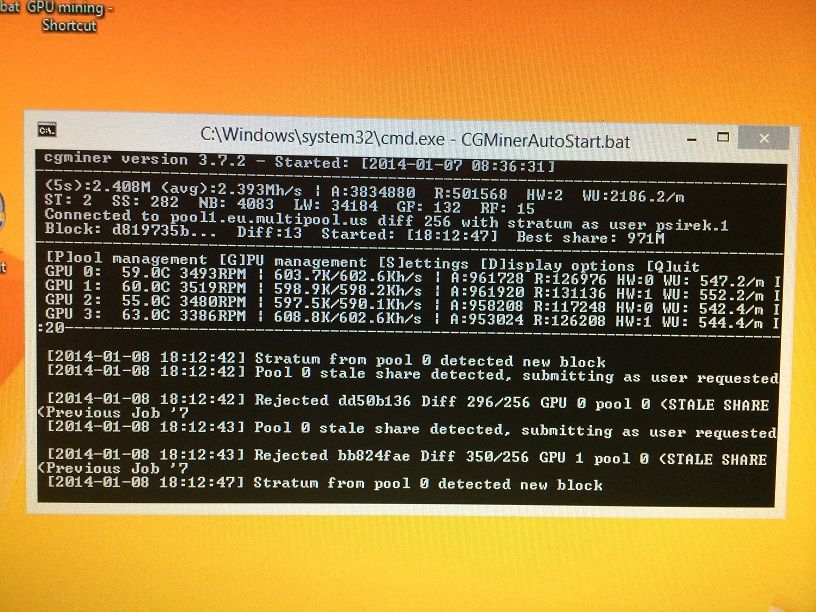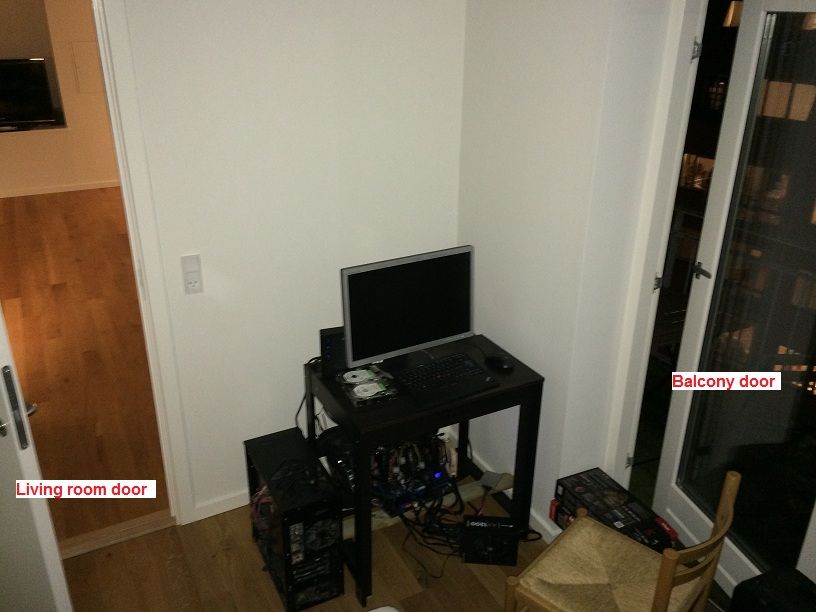Cryptocurrency mining: Bitcoin, Litecoin and more

You might have heard about digital currency called Bitcoin in the news. The value from a single Bitcoin has grown from a few dollars to 1200 USD and recently back to 1000 USD, a highly volatile currency.

It is open source, distributed, decentralised and uses cryptographic principles for securing the setup. For more information about this, please see:
http://bitcoin.org/en/
http://en.wikipedia.org/wiki/Cryptocurrency
http://en.wikipedia.org/wiki/Litecoin

Some highlights of Bitcoin usage that has caught the public:
- Silk Road - The Amazon of illegal drugs
- Assassination Market - A website that crowd-funds murder
- Bitcoin ATM - Deposit or withdraw Bitcoins
- Bitcoin laundery - Send money anonymously
- Cyprus crisis
- Chinese government crackdown on Bitcoin
To get started using Bitcoins one can download a Bitcoin wallet, like MultiBit or use an online wallet service like blockchain.info. Keep your wallet secure and keep backups, there are no central bank to help you if you get hacked, hard disk breaks down or you forget your password. A Bitcoin address looks like this (my donation address):
343m5YhZ7y78WokLVqHDFC6K2k896sWCNw
Which nobody can remember, with smartphone technology you can use you camera to scan QR codes representing the address and additional information. For this you can use the blockchain.info iPhone or android app.


To actually purchase some Bitcoins you can use online services which normally involves sending cash to their bank account since most do not accept credit cards. If you live in Denmark I recommend BitcoinNordic, i have used them and it works. They have a high commission rate of 4.9 percent and you cannot choose at what rate you would like to buy the Bitcoins. BitcoinNordic uses another exchange Bitstamp.net, here the fees are much lower. I use this exchange myself, more on this later in the post. Bitcoin is just one of many cryptocurrencies, but it is the first and most integrated of them all. Now, why is this so interesting besides potentially revolutionising currency as we know it? From wikipedia:
Within cryptocurrency systems, the safety, integrity, and balance of all ledgers is ensured by a swarm of mutually distrustful parties, referred to as miners, who are, for the most part, general members of the public, actively protecting the network by maintaining a high hash-rate difficulty for their chance at receiving a randomly distributed small fee. Basically, by using your computer with an internet connection you can join these networks and get a small amount of cryptocurrency which then again can be exchanged for “real” money, like USD or euros. With the correct price for electricity, cryptocurrency and difficulty in mining you can make actual money.

I have become one of these miners for a cryptocurrency called Litecoin and similar alternative currencies, which allows me to use standard graphics cards to make a profit “generating” these coins, trading them for Bitcoins, trading Bitcoins for USD, which is then converted via EURO to Danish Kroners in my bank account.
Hardware setup
For Litecoin mining I have bought four AMD Radeon graphic cards since these are most effective in mining Litecoins and other scrypt based cryptocurrency compared to Nvidia cards (see https://litecoin.info/Mining_hardware_comparison, performance is measured in kilohashes per second). Why not mine Bitcoin directly? This is because bitcoin using a different algorithm, SHA256, which now requires specialised hardware, ASIC (Application-specific integrated circuit), to have a chance to make any money.
Disclaimer
This post contains links to Amazon where I get a small commission if you purchase anything after clicking on these links - at no extra cost to you! But only if you have explicitly consented to this. I have purchased all the mentioned products myself and I only link to products that I believe are the best for my readers. If you want to help out even more, take a look here.- 4x Club3D Radeon 7950 graphic cards ~ 1190 USD
- Corsair AX1200 1200 watt powersupply ~ 330 USD
- 4GB DDR3 memory ~ 60 USD
- Intel Celeron G470 CPU ~ 52 USD
- 4x Powered PCI-E 1x - 16x Riser Cable with Molex ~ 35 USD
- MSI Z77A-G45 motherboard ~ 125 USD
- 2x 200mm case fans ~ 55 USD
- 1x 8 mm case fan ~ 10 USD
- Old SSD harddisk
Total ~ 1850 USD The setup is a bit improvised, the graphic cards are tied to a 18 USD IKEA computer desk I have bought, the motherboard and SSD hard disk are laying on a piece of broken garden fence and I have connected an old computer case to this setup so I can use the start and reset buttons to operate the system.

The total power used by this system measured from the wall socket is 975 watt.
Software setup
I run windows 8.1 since it was easier for me to tweak my graphics cards, else Linux would be a better choice in my opinion. To tweak the graphics cards I use a program called Trixx to set each card with the following settings:
- GPU clock: 1050
- Memory clock: 1475
- VDDC: 1.087
- Fan: Manual at 100%
I use CGMiner v3.7.2 which is the last version to support GPU mining, the config file can be found here. Since I did not have time to setup my router with VPN, I did a quick and dirty way of remote controlling the setup, introducing Dropbox remote management! Here is what I did:
- I setup windows to execute the bat file
AutoRun.batevery minute AutoRun.batsimply callsCGMinerAutoStart.batand renames itself toAutoRunExecuted.batto prevent further executing by the windows timer job- C
GMinerAutoStart.batkills any running instances of CGMiner.exe, deletes the generated binary files from CGMiner and sets some global settings. It then callscgminer.batwhich starts the mining process again
By editing the CGMiner config file I can change setting and mining pools easy. By logging to a directory in my dropbox folder I can see the output from CGMiner to confirm it is running correctly. To restart CGMiner after changes has been made I just rename AutoRunExecuted.bat to AutoRun.bat and wait. All the mentioned bat files can be downloaded here
One quirk I have noticed is that when rebooting the machine, the three graphic cards that are not connected to my monitor, stay in a low power state so performance is very low. I need to manually plug the DVI cable into each card and wait for a signal for the to “wake up”. I have tried using dummy VGA to DVI plugs, but it did not help. Any suggestions is appreciated.
Performance
Each card runs at 600 kilohashes per second, a total of 2.4 megahashes per second. With overclocking I could get further, but the cost in power (energy efficiency drops the warmer it gets), heat and noise would increase. It is important to hit the correct ration between the core and memory to get extra performance, if anyone got some suggestions for these Club3D cards, please contact me.

Noise and heating
Four graphics cards running full speed generates some noise and heat. With the door closed to the room containing the setup, the noise is minimal, standing in the same room however and the noise is quite loud. I have relatively low temperatures on the graphic cards, around 60 degrees Celsius, so I could tweak the cooling to lower the noise, but have not found the time. The small room gets very warm fast with the door closed, so I use this trick to get the best of both worlds

- When at home, I close the door to the room containing the setup to minimize noise. To prevent the graphics card to get to warm and therefore use more electricity / automatically lower performance to prevent overheating I open the door to the balcony. Danish winter cools the room nicely :)
- When leaving the home I close the door to the balcony and open the door to my living room. The setup generates enough heat to keep the apartment nice and warm when I get back
The noise measurements are as follows (using an iPhone app, not super accurate):
- Inside room with setup (3 feet from setup): 61 dB
- Outside the room right next to the door: 44 dB
- From sofa 15 feet away from door: 41 dB
On my to-do list is to isolate the door a bit more and if the noise turns out to be too much, then I will move the setup outside on the balcony in some weatherproof enclosure.
From cryptocurrency to actual money in my bank account
The output of my mining setup is scrypt based coins, like Litecoin (LTC), Dogecoin (DOGE) and Worldcoin (WDC). I mine these coins by joining a mining pool to share the work and the rewards. These mining pools even out the need for luck and provides a consistent payout of coins. Mining pools typically have small fees, around 0 - 3% of the coins awarded. The mining pools I use are:
- Coinotron - For mining Litecoin (LTC), but has support for other coins
- Multipool - Automatically mines the most profitable coin
Multipool uses and algorithm similar to the following sites to take into account difficulty of mining, reward size and value when calculating profit.
- CoinWarz
- CoinChoose
A word of caution when using mining profitability calculators found on many of these sites. Most do not take into account the constant rise in mining difficulty, which can be several percent a day! So take that into consideration if you want to get into the mining business.
Next step is transferring them to an exchange so we can trade them to Bitcoins (BTC) or any other coin we choose. I look at past values and try to sell them at a good price which might take days or I might choose to hold on to the coins and hope the price will go up later. The market is quite volatile so there is money to be made by speculating in this. I use these exchanges
- Coinedup - No trading fees, I use it to trade Dogecoin (DOGE) into Bitcoins (BTC)
- Cryptsy - Up to 0.3 percent trading fee, trades between many cryptocurrencies. Optional autotrade can be enabled for an additional 0.1 percent
- Bitstamp.net - Up to 0.5 percent trading fee, trades between Bitcoins (BTC) and USD
When I want to sell my coins for real money, like USD or EURO I transfer my Bitcoins to Bitstamp. Typically there is a small withdrawal fee to get coins out of the exchanges. To transfer USD to my bank account I need to be authorized by Bitstamp by supplying them with a picture ID and proof of residence. It costs 0.9 EURO + 20 Danish Kroners my bank charges to withdraw money to my bank account which arrives after a week. A total of about 10 USD per withdrawal.
Economy
I have made the following with my setup running 39 days and my initiation investment of 275 USD into Bitcoins. This is actual uptime my setup has had, the three days downtime I had I subtracted, since no power was used (it rained into my wall socket on the balcony, turned off all power!):
| Expenses | Price |
|---|---|
| Hardware setup | $1.850 |
| Bitcoin investment | $275 |
| Wireless internet | $14 |
| Powerbill (975 watt) | $399 |
| Total | $2.537 |
| Income | Price |
|---|---|
| Return on Bitcoin investment | $640 |
| Cryptocurrency sold | $256 |
| Cryptocurrency held in wallets | $634 |
| Sale of spare parts leftover | $73 |
| Total | $1.604 |
Profit: -$934
If I sell my hardware for half price, then I will break even on everything. I will let the setup run for another month or two and see where it takes me. As you can see, the power cost I substantial here in Denmark, 399 USD, and it generated 256 + 634 = 890 USD. If I had access to very cheap or free power, then my profit would increase 50%. With the increasing difficulty in mining one would expect a decline in profit, but with the volatile market prices it is hard to tell. Now as the good citizen I am I have contacted the Danish tax authority about paying taxes of my profit (if I even get a profit) and they kindly replied that they will respond within 3 months with an answer. For now I consider this a hobby business (“Hobbyvirksomhed” in Danish) which means I have to pay taxes of my profit when I get it.
– UPDATE 08-05-2014 —
I let the setup run for a total of 80 days before I shut it down, here are the updated results:
| Expenses | Price |
|---|---|
| Hardware setup | $1.850 |
| Bitcoin investment | $275 |
| Wireless internet | $31 |
| Powerbill (975 watt) | $764 |
| Total | $2.920 |
| Income | Price |
|---|---|
| Return on Bitcoin investment | $640 |
| Cryptocurrency sold | $1.491 |
| Cryptocurrency held in wallets | $8 |
| Sale of spare parts leftover | $75 |
| Sale of 4 GPU | $1.109 |
| Total | $3.323 |
Profit: $402
In addition to the above $402 in profit I have hardware leftover for $577.
Conclusion
I am happy with my setup, i have currently generated enough money to pay for the experiment if i sell the setup for half price, got free heating during Danish winter and have quenched my curiosity of cryptocurrency. My recommendation to others is:
- Never invest more than you are willing to lose. Cryptocurrency is volatile and could be worthless any second
- While mining cryptocurrency is fun to try, you might not make enough money to pay for the equipment. If you already own the hardware try it, but if not consider starting out taking advantage of the volatile market.
- Take backups and do not keep too much money in a single wallet
- If you have a girlfriend, wife or roommate, consider that the noise might be disturbing
Enjoyed this content?
Help keep it free by sending a donation. You can also subscribe to various site feeds to get notified of new posts, follow me on social media, and more.